#brook is a beautiful poet
Note
would you like to explain your favorite extremely short poem, please?

this translation of catullus 85. something abt "but i feel it, and it shivers me." like love & hate are not uniquely felt expect when together, & that togetherness is haunting, haunting enough to make the body react

we real cool by gwendolyn brooks. love that the body is monosyllablic. love the ending of "we / die soon." the placement of "we" almost exclusively to the left, with no left "we" for the final line. i remember reading it as a young teen over & over
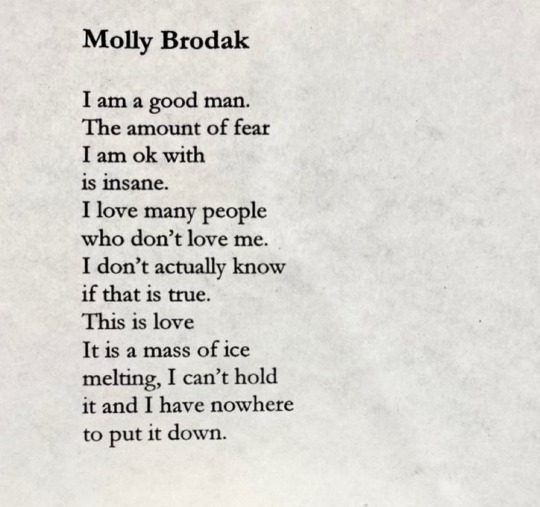
self titled (molly brodak) by molly brodak. just love her work as a whole. love that it is self titled—feels very declarative. the first line "i am a good man" has been impacting me a lot since brodak's husband recently came out saying she cheated on him & he only found out after her suicide!!!
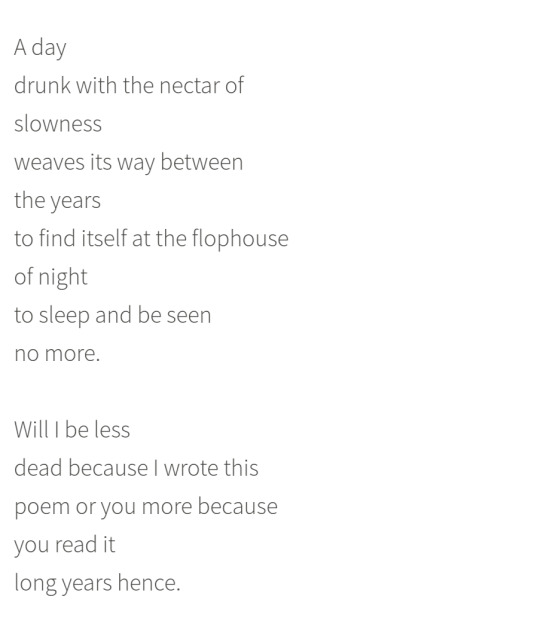
wonder by maya angelou. just... love her. love how matter of fact she was & still so poetic. one of the first poets i ever loved. "drunk with the nectar of slowness" is so beautiful to me

vulnerability study by solmaz sharif. i mean what is there to say? the juxtaposition. the opening line. the final line. it punches me right through every time
504 notes
·
View notes
Text

Algy knew it… it was going to rain again! And very soon now, if he wasn't much mistaken. Yesterday's sunshine had vanished just as quickly as it had come, and although the new day had started in a reasonably bright sort of way, it had soon changed its mind and clouded over, and now the sky was turning darker and darker by the minute.
So Algy flew up into the bushes and wallowed happily in a sea of beautiful hydrangeas, before they became truly awash once more. Somewhere behind him a robin was trilling its autumn song, and Algy knew that the seasons had turned once again. Hoping that perhaps the coming months would bear more resemblance to Keats' famous poem than to the typical West Highland autumn he knew only too well, Algy recited the verses out loud to the bees who were busily investigating the flowers all around him, although they seemed too intent on their work to pay much attention:
Season of mists and mellow fruitfulness,
Close bosom-friend of the maturing sun;
Conspiring with him how to load and bless
With fruit the vines that round the thatch-eves run;
To bend with apples the moss’d cottage-trees,
And fill all fruit with ripeness to the core;
To swell the gourd, and plump the hazel shells
With a sweet kernel; to set budding more,
And still more, later flowers for the bees,
Until they think warm days will never cease,
For summer has o’er-brimm’d their clammy cells.
Who hath not seen thee oft amid thy store?
Sometimes whoever seeks abroad may find
Thee sitting careless on a granary floor,
Thy hair soft-lifted by the winnowing wind;
Or on a half-reap’d furrow sound asleep,
Drowsed with the fume of poppies, while thy hook
Spares the next swath and all its twined flowers:
And sometimes like a gleaner thou dost keep
Steady thy laden head across a brook;
Or by a cider-press, with patient look,
Thou watchest the last oozings, hours by hours.
Where are the songs of Spring? Ay, where are they?
Think not of them, thou hast thy music too,—
While barred clouds bloom the soft-dying day,
And touch the stubble-plains with rosy hue;
Then in a wailful choir the small gnats mourn
Among the river sallows, borne aloft
Or sinking as the light wind lives or dies;
And full-grown lambs loud bleat from hilly bourn;
Hedge-crickets sing; and now with treble soft
The redbreast whistles from a garden-croft,
And gathering swallows twitter in the skies.
[Algy is of course reciting one of the most famous poems in English literature, To Autumn, by the early 19th centure English poet John Keats.]
#Algy#photographers on tumblr#writers on tumblr#to autumn#hydrangeas#john keats#poem#poetry#Scottish Highlands#Scotland#autumn#fall#Scottish weather#adventures of algy#jenny chapman#original content
53 notes
·
View notes
Text
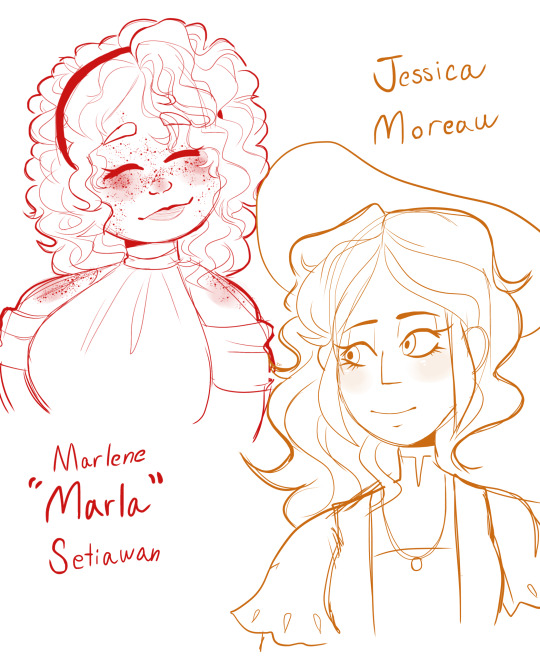

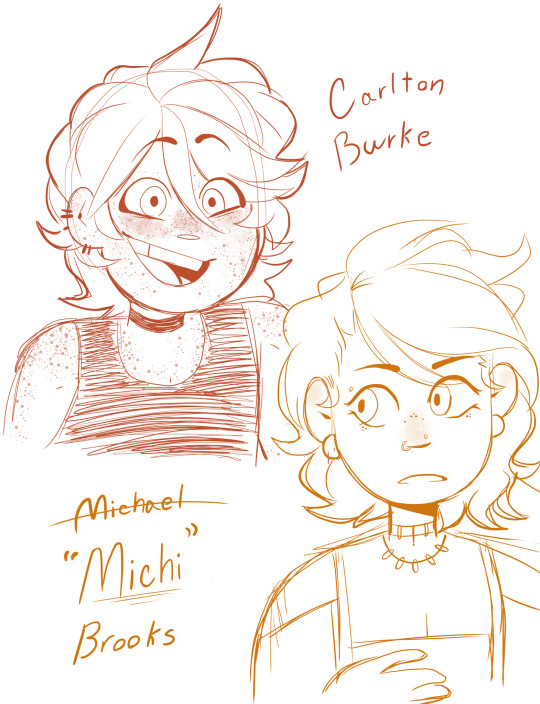
🍕 Those Meddling Kids ! 🍕
👇 Headcanons for these fools 👇
Marlene “Marla” Setiawan
-The resident mom friend
-Very huggable
-Loves PDA
-She later on became the legal guardian of her younger brother Jason at age 24 after the passing of their parents
-Pansexual, cis fem, she/her
-Works as a undertaker at Hurricane Cemetery, she takes regular care of Charlie’s headstone.
Jessica Moreau
-Brains & beauty
-Frequently travels
-Works as a forensic scientist for the Hurricane Police Department (although she is often reached out to by other departments due to her stellar work)
-She & Carlton were Charlie’s best friends, she still missed Charlie to this day..
-Lesbian asexual, cis fem, she/her
Lamar Asher
-Got the hell on out of Hurricane. Smart move.
-He began work as a child therapist after moving to New Jersey. He remains in college to work towards expanding his knowledge of psychology.
-Keeps contact with all his friends despite their distance. Him and Marla keep the most in check.
-Demiromantic asexual, demiboy, he/they
Jonathan “John” Connors
-Resident sad lad
-A poet and writer in the Hurricane community
-Able to easily read the feelings of others. He’s jokingly called a aura reader by the gang.
-Had a small childhood crush on Charlie that never went anywhere due to their untimely death.
-Pansexual, cis male, he/him
Carlton Burke
-A golden retriever embodied
-Charlie, Jessica, and Michi’s best friend.
-Him and Michi are dating and live together in a small apartment
-The local homebody, he works at a grocery store as a simple calm job. He and his father frequently clash due to Carlton’s decision to not join the police force.
-Bisexual, cis male, he/him
Michael “Michi” Brooks
-Suprise! She’s alive!
-He was almost killed during his youth, as Afton had initially preyed on him as a potential target. However, he decided against that as she was frequently around her parents.
-Works as a artist for commission, frequently painting murals in honor of the missing children, including her best friend Charlie.
-Set up a scholarship in honor of the missing kids, focusing on helping students who seek out roles in education, psychology, and helping out victims of abuse.
-Demiromantic bisexual, bigender, she/he
#my art#sketch#fnaf#five nights at freddy's#fnaf au#fnaf novels#fnaf the silver eyes#fnaf the twisted ones#fnaf the fourth closet#fnaf marla#fnaf jessica#carlton burke#michael brooks#fnaf lamar#fnaf john#this is set in the game-verse which is why Michael’s here instead of Charlie#Charlie is very dead.
85 notes
·
View notes
Text
queer novel masterlist
cleaning up that post i've got running with books that touch on queerness. these are not organized in any particular fashion, or gathered along any particular theme. these are just gay novels i've either read and enjoyed or would like to read. blurbs are the books' own descriptions of themselves. not all these blurbs mention the queer stuff, but trust, if it's on this list it's in there. last updated 9 dec 23.
lists: sapphic books by Palestinian authors; butch memoirs; another list of masc, butch and stud books; a digital library of trans-related content; free access to the works of Leslie Feinberg.
After Sappho, Selby Wynn Schwartz.
"“The first thing we did was change our names. We were going to be Sappho,” so begins this intrepid debut novel, centuries after the Greek poet penned her lyric verse. Ignited by the same muse, a myriad of women break from their small, predetermined lives for seemingly disparate paths: in 1892, Rina Faccio trades her needlepoint for a pen; in 1902, Romaine Brooks sails for Capri with nothing but her clotted paintbrushes; and in 1923, Virginia Woolf writes: “I want to make life fuller and fuller.” Writing in cascading vignettes, Selby Wynn Schwartz spins an invigorating tale of women whose narratives converge and splinter as they forge queer identities and claim the right to their own lives. A luminous meditation on creativity, education, and identity, After Sappho announces a writer as ingenious as the trailblazers of our past."
All Boys Aren't Blue, George M. Johnson
In a series of personal essays, prominent journalist and LGBTQIA+ activist George M. Johnson's All Boys Aren't Blue explores his childhood, adolescence, and college years in New Jersey and Virginia.
The works of Dionne Brand:
In Another Place, Not Here. Beautiful and meticulously wrought, set in both Toronto and the Caribbean, this astonishing novel gives voice to the power of love and belonging in a story of two women, profoundly different, each in her own spiritual exile.
Love Enough. In Love Enough, the sharp beauty of Brand's writing draws us effortlessly into the intersecting stories of her characters caught in the middle of choices, apprehensions, fears. Each of the tales here—June's, Bedri's, Da'uud's, Lia's opens a different window on the city they all live in, mostly in parallel, but occasionally, delicately, touching and crossing one another. Each story radiates other stories. In these pages, the urban landscape cannot be untangled from the emotional one; they mingle, shift and cleave to one another.
The young man Bedri experiences the terrible isolation brought about by an act of violence, while his father, Da'uud, casualty of a geopolitical conflict, driving a taxi, is witness to curious gestures of love and anger; Lia faces the sometimes unbridgeable chasms of family; and fierce June, ambivalent and passionate with her string of lovers, now in middle age discovers: "There is nothing universal or timeless about this love business. It is hard if you really want to do it right." Brand is our greatest observer—of actions, of emotions, of the little things that often go unnoticed but can mean the turn of a day. At once lucid and dream-like, Love Enough is a profoundly modern work that speaks to the most fundamental questions of how we live now.
What We All Long For. Tuyen is an aspiring artist and the daughter of Vietnamese parents who've never recovered from losing one of their children while in the rush to flee Vietnam in the 1970s. She rejects her immigrant family's hard-won lifestyle, and instead lives in a rundown apartment with friends—each of whom is grappling with their own familial complexities and heartache.
By turns thrilling and heartbreaking, Tuyen's lost brother—who has since become a criminal in the Thai underworld—journeys to Toronto to find his long-lost family. As Quy's arrival nears, tensions build, friendships are tested, and an unexpected encounter will forever alter the lives of Tuyen and her friends. Gripping at times, heartrending at others, What We All Long For is an ode to a generation of longing and identity, and to the rhythms and pulses of a city and its burgeoning, questioning youth.
The Human Origins of Beatrice Porter and Other Essential Ghosts, Soraya Palmer.
Sisters Zora and Sasha Porter are drifting apart. Bearing witness to their father’s violence and their mother’s worsening illness, an unsettled Zora escapes into her journal, dreaming of being a writer, while Sasha discovers sex and chest binding, spending more time with her new girlfriend than at home.
But the sisters, like their parents, must come together to answer to something more ancient and powerful than they know—and reckon with a family secret buried in the past. A tale told from the perspective of a mischievous narrator, featuring the Rolling Calf who haunts butchers, Mama Dglo who lives in the ocean, a vain tiger, and an outsmarted snake, The Human Origins of Beatrice Porter and Other Essential Ghosts is set in a world as alive and unpredictable as Helen Oyeyemi’s.
Telling of the love between sisters who don’t always see eye to eye, this extraordinary debut novel is a celebration of the power of stories, asking, What happens to us when our stories are erased? Do we disappear? Or do we come back haunting?
Before We Were Trans, Kit Heyam.
Today’s narratives about trans people tend to feature individuals with stable gender identities that fit neatly into the categories of male or female. Those stories, while important, fail to account for the complex realities of many trans people’s lives.
Before We Were Trans illuminates the stories of people across the globe, from antiquity to the present, whose experiences of gender have defied binary categories. Blending historical analysis with sharp cultural criticism, trans historian and activist Kit Heyam offers a new, radically inclusive trans history, chronicling expressions of trans experience that are often overlooked, like gender-nonconforming fashion and wartime stage performance. Before We Were Trans transports us from Renaissance Venice to seventeenth-century Angola, from Edo Japan to early America, and looks to the past to uncover new horizons for possible trans futures.
Odd Girls and Twilight Lovers, Lillian Faderman.
As Lillian Faderman writes, there are "no constants with regard to lesbianism," except that lesbians prefer women. In this groundbreaking book, she reclaims the history of lesbian life in twentieth-century America, tracing the evolution of lesbian identity and subcultures from early networks to more recent diverse lifestyles. She draws from journals, unpublished manuscripts, songs, media accounts, novels, medical literature, pop culture artifacts, and oral histories by lesbians of all ages and backgrounds, uncovering a narrative of uncommon depth and originality.
note from roo: essay in this about how queer white women engaged with Harlem should be essential reading for white queers who enter spaces (like drag spaces, ballroom spaces etc) that are informed by Black culture.
Land of Milk and Honey, C Pam Zhang.
A smog has spread. Food crops are rapidly disappearing. A chef escapes her dying career in a dreary city to take a job at a decadent mountaintop colony seemingly free of the world's troubles.
There, the sky is clear again. Rare ingredients abound. Her enigmatic employer and his visionary daughter have built a lush new life for the global elite, one that reawakens the chef to the pleasures of taste, touch, and her own body.In this atmosphere of hidden wonders and cool, seductive violence, the chef's boundaries undergo a thrilling erosion. Soon she is pushed to the center of a startling attempt to reshape the world far beyond the plate.
Sensuous and surprising, joyous and bitingly sharp, told in language as alluring as it is original, Land of Milk and Honey lays provocatively bare the ethics of seeking pleasure in a dying world. It is a daringly imaginative exploration of desire and deception, privilege and faith, and the roles we play to survive. Most of all, it is a love letter to food, to wild delight, and to the transformative power of a woman embracing her own appetite.
Grievers and Maroons by adrienne maree brown.
Grievers is the story of a city so plagued by grief that it can no longer function. Dune’s mother is patient zero of a mysterious illness that stops people in their tracks—in mid-sentence, mid-action, mid-life—casting them into a nonresponsive state from which no one recovers. Dune must navigate poverty and the loss of her mother as Detroit’s hospitals, morgues, and graveyards begin to overflow. As the quarantined city slowly empties of life, she investigates what caused the plague, and what might end it. In anguish, she follows in the footsteps of her late researcher father, who has a physical model of Detroit’s history and losses set up in their basement. She dusts the model off and begins tracking the sick and dying, discovering patterns, finding comrades in curiosity, conspiracies for the fertile ground of the city, and the unexpected magic that emerges when the debt of grief is cleared.
In the second installment of the Grievers trilogy, adrienne maree brown brings to bear her background as an activist rooted in Detroit. The pandemic of Syndrome H-8 continues to ravage the city of Detroit and everyone in Dune's life. In Maroons, she must learn what community and connection mean in the lonely wake of a fatal virus. Emerging from grief to follow a subtle path of small pleasures through an abandoned urban landscape, she begins finding other unlikely survivors with little in common but the will to live. Together they begin to piece together the puzzle of their survival, and that of the city itself.
Elastoe, Darcie Little Badger.
"Elatsoe—Ellie for short—lives in an alternate contemporary America shaped by the ancestral magics and knowledge of its Indigenous and immigrant groups. She can raise the spirits of dead animals—most importantly, her ghost dog Kirby. When her beloved cousin dies, all signs point to a car crash, but his ghost tells her otherwise: He was murdered. Who killed him and how did he die? With the help of her family, her best friend Jay, and the memory great, great, great, great, great, great grandmother, Elatsoe, must track down the killer and unravel the mystery of this creepy town and it’s dark past. But will the nefarious townsfolk and a mysterious Doctor stop her before she gets started? A breathtaking debut novel featuring an asexual, Apache teen protagonist, Elatsoe combines mystery, horror, noir, ancestral knowledge, haunting illustrations, fantasy elements, and is one of the most-talked about debuts of the year."
Sordidez, by E.G. Condé
"In the ruin created by climate disaster and a devastating civil war, survivors in Puerto Rico and the Yucatán peninsula struggle to rebuild their communities and heal their lands, but powerful forces from abroad plot against them. Desperate for answers, Puerto Rican journalist Vero Diaz seeks the counsel of the Maya revolutionary known as the Loba Roja, triggering a chain of events that will forever reshape his destiny and the fate of the Caribbean world."
When They Tell You To Be Good, by Prince Shakur
"When They Tell You to Be Good charts Shakur’s political coming of age from closeted queer kid in a Jamaican family to radicalized adult traveler, writer, and anarchist in Obama and Trump’s America. Shakur journeys from France to the Philippines, South Korea, and elsewhere to discover the depths of the Black experience, and engages in deep political questions while participating in movements like Black Lives Matter and Standing Rock. By the end, Shakur reckons with his identity, his family’s immigration, and the intergenerational impacts of patriarchal and colonial violence."
My Government Means to Kill Me, Rasheed Newson
"Earl "Trey" Singleton III arrives in New York City with only a few dollars in his pocket. Born into a wealthy Black Indianapolis family, at 17, he is ready to leave his overbearing parents and their expectations behind.
In the city, Trey meets up with a cast of characters that changes his life forever. He volunteers at a renegade home hospice for AIDS patients, and after being put to the test by gay rights activists, becomes a member of the AIDS Coalition to Unleash Power (ACT UP). Along the way Trey attempts to navigate past traumas and searches for ways to maintain familial relationships—all while seeking the meaning of life amid so much death.
Vibrant, humorous, and fraught with entanglements, Rasheed Newson’s My Government Means to Kill Me is an exhilarating, fast-paced coming-of-age story that lends itself to a larger discussion about what it means for a young gay Black man in the mid-1980s to come to terms with his role in the midst of a political and social reckoning."
Where There Was Fire, John Manuel Arias
Costa Rica, 1968. When a lethal fire erupts at the American Fruit Company’s most lucrative banana plantation burning all evidence of a massive cover-up, and her husband disappears, the future of Teresa’s family is changed forever.
Now, twenty-seven years later, Teresa and her daughter Lyra are picking up the pieces. Lyra wants nothing to do with Teresa, but is desperate to find out what happened to her family that fateful night. Teresa, haunted by a missing husband and the bitter ghost of her mother, Amarga, is unable to reconcile the past. What unfolds is a story of a mother and daughter trying to forgive what they do not yet understand, and the mystery at the heart of one family’s rupture.
Brimming with ancestral spirits, omens, and the anthropomorphic forces of nature, John Manuel Arias weaves a brilliant tapestry of love, loss, secrets, and redemption in Where There Was Fire.
#queer lit#qlit#queer fiction#queer memoirs#queer history#lgbt history#lgbt writers#lgbtq writers#lgbt novels#lgbtq novels#queer novels#tbr#to be read#reading list#queer reading list
41 notes
·
View notes
Text

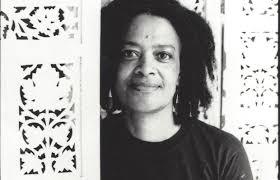
Toni Cade Bambara & June Jordan
Toni Cade Bambara and June Jordan were influential writers and activists who played significant roles in creating space for Black individuals within predominantly white spaces, much like Ms. Sharayna Christmas.
Toni Cade Bambara, best known for her novel "The Salt Eaters" and her short story collection "Gorilla, My Love," was deeply committed to representing the lives and experiences of Black people, particularly Black women, in her work. She often explored themes of race, gender, class, and identity, offering portrayals that challenged stereotypes and celebrated the diversity of Black experiences. Through her writing, Bambara gave space for Black voices in the literary world, asserting the importance of their stories. In her 1982 interview with Kay Bonetti, Toni Cade Bambara says that, "As a cultural worker who belongs to an oppressed people my job is to make revolution irresistible. One of the ways I attempt to do that is by celebrating those victories within the black community."
June Jordan, a prolific poet, essayist, and activist, was similarly dedicated to advocating for social justice and amplifying marginalized voices. Her poetry often addressed issues of racism, sexism, and oppression, while also celebrating the resilience and beauty of Black culture. Jordan was a powerful advocate for intersectionality, recognizing the interconnectedness of various forms of oppression and the importance of solidarity across different marginalized groups. Through her writing and activism, Jordan helped to create spaces where Black individuals could assert their identities and demand recognition and equality. During her career, June Jordan also taught at several colleges such as CUNY, Sarah Lawrence College, Yale University, SUNY Stony Brook, and University of California-Berkeley. Within her offered classes and student outreach, Jordan disrupted the status quo within these white institutions and swayed many student towards the path of activism.
Both Bambara and Jordan understood the importance of representation and self-expression in challenging systems of oppression and creating spaces where Black individuals could thrive. Through their literary contributions and their activism, they paved the way for future generations of Black writers, artists, and activists to assert their voices and claim their rightful place in predominantly white spaces.
6 notes
·
View notes
Text
THIS DAY IN GAY HISTORY
based on: The White Crane Institute's 'Gay Wisdom', Gay Birthdays, Gay For Today, Famous GLBT, glbt-Gay Encylopedia, Today in Gay History, Wikipedia, and more … August 3



1887 – Rupert Brooke was an English poet (d.1915), known for his idealistic War Sonnets written during WWI (especially The Soldier), as well as for his poetry written outside of war, especially The Old Vicarage, Grantchester and The Great Lover. He was also known for his boyish good looks, which prompted W.B. Yeats to describe him as "the handsomest young man in England".
Brooke fell heavily in love several times with both men and women, although his bisexuality was edited out of his life by his first literary executor. Many more people were in love with him
As a war poet came Brooke to public attention when The Times Literary Supplement quoted two of his five sonnets (IV: The Dead and V: The Soldier) in full on 11 March 1915 and subsequently his sonnet V: The Soldier was read from the pulpit of St.Paul's on Easter Sunday. Brooke's most famous collection of poetry containing all five sonnets, 1914 & Other Poems, was first published in May 1915, and in testament to his popularity ran through 11 further impressions that year, and by June 1918 had reached its 24th impression; a process undoubtedly fuelled through posthumous interest and the continuing war against Germany.
When he died at the age of twenty-seven while on his way to fight at Gallipoli, he became inextricably linked in the public mind with his sonnets glorifying war, and a national hero was born—one bearing little resemblance to the actual man. To maintain the patriotic legend, Brooke's first literary executor, Geoffrey Keynes, spent a lifetime trying to downplay Brooke's attraction to men. However, until December 1907, when Brooke was twenty years old, he never—in his personal relationships or in his letters—exhibited any attraction to the opposite sex.
When Keynes edited a collection of Brooke's letters, even he felt compelled to allow into print some of them from Brooke's schoolboy days describing crushes on other boys—two in particular—although their names (Charles Lascelles and Michael Sadleir) were deleted by Keynes. Brooke's love for these two boys was deeply felt (particularly in the case of Lascelles), but it was not until the age of twenty-two that he engaged in sex with another man, Denham Russell Smith, the younger brother of a friend. In July 1912, a few days following Smith's death from an infection, Brooke described his seduction of Smith in surprising detail in a letter to James Strachey. It is the only account that Brooke ever wrote detailing his own sex act with another person, although he did acknowledge in another letter to Strachey that he had consummated an affair with their mutual friend Katherine Cox.
There is considerable evidence in Brooke's writing of his attraction to men aside from his declarations of affection for Lascelles and Sadleir and his seduction of Denham Russell Smith. He once, for example, referred to his friend Jacques Raverat as one of the few men in England with whom he had never been in love. In another instance, as he was training for war Brooke wrote in a letter, "Occasionally I'm faintly shaken by a suspicion that I might find incredible beauty in the washing place, with rows of naked, superb men, bathing in a September sun."
Brooke was apparently bisexual, however, rather than homosexual, for his torturous relationships with women have been well documented. In one of his personal notebooks he shows a strong identification with Shakespeare because of the latter's love of both sexes: "The truth is that some great men are sodomites and womanizers."
Throughout his life, Brooke had close friends who were homosexual, and usually in love with him. As a schoolboy at Rugby, he was befriended by the aesthetic poet John Lucas-Lucas. At Cambridge, his best friend was James Strachey, who worshiped him. His best friend at the end of his life was Edward Marsh, who was as much in love with him as Strachey had been.
After the war, Brooke's friends complained that the heroic myth of Brooke's patriotic self-sacrifice was deliberately exaggerated to encourage more young men to enlist. Generations of schoolchildren were taught the opening lines of his most famous poem The Soldier:
"If I should die, think only this of me:
That there's some corner of a foreign field
That is for ever England."
Brooke's death was caused not by the bullet or bomb, but from septic pneumonia caused by an infected mosquito bite . Due to the hurry to get to Gallipoli, he was buried and remains on the Greek island of Skyros - perfectly encapsulating the sentiment of his famous poem.


1916 – The Irish patriot, poet, revolutionary, and nationalist Sir Roger Casement was hanged for treason on this date (b.1864).
The British consul, born in Sandycove, County Dublin served in various posts in Africa and South America and was knighted in 1911. In 1916 he was arrested for treason by the British for his involvement in the Irish National cause and was hanged in the Pentonville prison.
After his arrest his diaries, which had homoerotic content, were made public. The documents, which covered the years 1903, 1910 and 1911, purportedly showed Casement to have been a promiscuous homosexual sex tourist with a fondness for young men. On account of their pornographic content, these were termed the 'Black Diaries', and were distinguished from the 'White Diaries' where Casement supposedly omitted sexual references and recorded only details of his humanitarian work and private business.
In a time of strong social conservatism, not least among Irish Catholics, the Black Diaries undermined or at least stifled support for Casement. Archbishop Davidson, concerned at the rumours, arranged for John Harris of the Anti-Slavery Society, and a missionary friend of Casement's, to view the diaries; Harris was shattered when he realised they were authentic.
Generally speaking, proponents of Irish Nationalism (especially religious Catholics) and Republicanism and uninvolved foreign experts in the field of forgery tend to disbelieve the Black diaries, whereas opponents of Nationalism, Unionists and Gay Rights' activists tend to consider them authentic.


1916 – Gordon Merrick (d. 1988), best-selling author of gay-themed novels, was one of the first authors to write about homosexual themes for a mass audience.
During most of Merrick's life, homosexuality was still viewed in the American culture as a moral outrage. Editors and film censors demanded that gay men be depicted objectionably, and that gay relationships end tragically in literature and on film. Merrick, however, wrote stories which depicted well-adjusted gay men engaged in romantic relationships. And each of his books had a happy ending.
Gordon Merrick was born in a suburb of Philadelphia. His father was a stockbroker. Merrick enrolled at Princeton University in 1939, studied French literature and was active in student theatre. He quit in the middle of his junior year and moved to New York City, where he became an actor. He landed a role in George S Kaufman and Moss Hart's The Man Who Came to Dinner. Although he became Hart's lover for a time, Merrick tired of the theatre.
In 1941, Merrick quit Broadway to become a reporter. Exempt from the draft because of problems with his hearing, Merrick moved to Washington, D.C. where he got a job with the Washington Star. He later worked for the Baltimore Sun, then returned to New York to write for the New York Post. His years as a reporter helped him develop a love of writing as well as a writing style.
Still eager to participate in World War II, Merrick sought and won a job with the Office of Strategic Services (OSS, the forerunner to the CIA). He was sent to Algeria as a counter-espionage agent, rising to the civilian rank of captain. He was diverted to France and took up residence in Cannes. Because he spoke excellent French, the OSS gave him papers listing him as a French citizen.
In August 1945, Merrick returned to the United States. He tried to find work as a reporter again, but failed. So he went to Mexico and began writing.
Merrick's first novel, The Strumpet Wind (1947), was a huge success in the US for an gay novel. The somewhat autobiographical novel is about a gay American spy in France during World War II. With the money he earned, Merrick returned to France. Merrick continued to write in France, but success eluded him. He left France to avoid the unrest which accompanied the Algerian War of Independence. Merrick moved to Greece and took up residence on the island of Hydra.
During his Greek tenure, Merrick's best-known book, The Lord Won't Mind, became his second major American success. Charlie Mills and Peter Martin are both young, handsome and well-endowed. They meet and fall madly in love. The book follows Charlie's path from a closeted gay man to a person who accepts himself. It is through Charlie's odyssey that the reader catches a glimpse of Merrick's interest in the problems that the gay male experiences establishing an identity. However, it has been criticised for its insistence on beauty in the gay male world.

The book appeared on the New York Times Best Seller list for 16 weeks in 1970. The first in a trilogy, Merrick followed it up with One for the Gods (1971) and Forth into Light (1974).
Merrick quit Greece in the mid-1970s when the local tourism industry made Hydra too crowded for his taste. In 1975, he moved to Ceylon (now Sri Lanka). But he returned to France occasionally, eventually purchasing a home in Tricqueville. For the rest of his life, he divided his time between the two countries.
Gordon Merrick died in Colombo, Sri Lanka, of lung cancer on March 27, 1988. He was survived by his partner, Charles G. Hulse.
In all, Merrick wrote 13 books. He contributed book reviews and articles to The New Republic, Ikonos and other periodicals. But only his later works were successful. Merrick's works are rarely included in anthologies, and few discussions of American gay authors mention him. Some are dismiss Merrick because of his obvious romanticism; others do so because he sprinkles explicit scenes of gay sex throughout each novel.
But underneath the handsome blond studs with too much wealth falling in love on the Cote d'Azur are fairly progressive and even radical conceptualisations of what it means to be gay, the likelihood of self-actualisation, identity politics and the role power plays in relationships. Especially in his later works, Merrick rejected socially-imposed roles and labels, insisting that each gay person question the assumptions underlying his life. But his novels are ultimately romantic fiction for gay men.


1982 – On this date in Atlanta, Georgia police entered Michael Hardwick's home (his roommate let them in), found him in bed with another man, and arrested him for sodomy. This led to an unsuccessful U.S. Supreme Court challenge of Georgia's sodomy laws, now known as Bowers v. Hardwick. The issue of sodomy laws would be settled in Lawrence v. Texas which overturned the Hardwick decision.
But what were the police doing at Hardwick's house in the first place?
They had a warrant to arrest him for failure to pay a misdemeanor ticket that he had already paid.


1982 – Robert Stadlober is an Austrian actor and musician. His sister is Anja Stadlober, also an actress.
Robert Stadlober was born in the Austrian province of Carinthia and grew up in Puchfeld in the Steiermark (Austria) and in Berlin (Germany). As a child he worked as a voiceover artist for several films and he acted in different TV productions and motion picture films also.
His largest success is playing the main role as Benjamin Lebert, a partially disabled teenager at a boarding school, in the film Crazy (2000). Later, he starred in Sommersturm (Summer Storm) (2004), a gay coming-of-age story set at a rowing summer-camp.
Although The Advocate has claimed that he is bisexual, Stadtlober himself objects to such labelling, saying that he's just had some homosexual experiences and that this is normal.
He was awarded the "best young actor" award at the Montreal International Film Festival in 2004 for his portrayal in Summer Storm.
He is also a singer and musician. He used to be in the rock Band Gary with David Winter and Rasmus Engler where he was the lead singer and played the guitar. He is now a third of Indie band Escorial Gruen.


2008 – Constable Robert Ploughman, is instrumental in getting RCMP participation in Vancouver Pride Parade.
Robert Ploughman (b.1972), born in Newfoundland, was the first gay man to come out during RCMP training, and the first gay officer to continue serving after coming out. He came out in Regina after his RCMP training troop received a stern warning against homophobic responses from a drill corporal.
"I went to depot with every intention of staying in the closet until my training was over and I was mounted," he says. The corporal told them one way to get kicked out was to make fun of homosexuals or Newfies.
"I thought to myself: 'My God, I'm both. I own this place.'"
On the weekends, Ploughman would disappear, leading his troopmates to believe he was being taken care of by an older woman. When he introduced his 24-year-old boyfriend to the troop, jaws dropped.
After the initial shock, he began answering the troop's questions. For many, he was the first contact with an openly gay man. At the end of their training, the local queer community sponsored a graduation party. The newly minted officers got free drinks. A picture of the troop clad in red serge remains on the wall of a Regina bar. Ploughman was class valedictorian.
"Of course, my gay brothers were quite excited to see me show up with 10, six-foot-two blonde-haired, blue-eyed Mountie cadets."
Despite a 2001 controversy about recruits being questioned about their sexuality, Ploughman says it never arose in his case. He acknowledges that until 1988, homosexuality was a cause for not being hired as it was considered a threat to being granted a top secret security clearance because of blackmail issues.
With a Master's degree in divinity and a bachelor's degree in criminology, Ploughman spent eight years in seminary before having his epiphany. He was only months away from ordination as a Catholic priest but knew at that moment he could not reconcile his sexuality with service in the church.
"I always knew I was attracted to men but I never really explored it or worried about it. I walked into the door of the gay bar in St. John's for the first time in my life and looked around and saw all these guys that looked like normal people. I had no contact with the gay community before that point. I said: 'My God, I'm gay. I'm gone. I'm finished.' "
"I see the priesthood and the RCMP as being very similar: spiritual law enforcement and physical law enforcement. You wear a uniform. Everyone's either on their best behaviour or worst behaviour when you're walking around. Everybody lies to you."
He sees the RCMP as a chance to serve gays, lesbians, bisexuals and trangenders. "I can reach out and serve this community . . . in a way that has never been done before in terms of an open, gay male Mountie."
Ploughman’s success in getting the RCMP into the Pride parade is more evidence that he’s part of a larger shift. When Ploughman started pushing for the RCMP to join the march, there were concerns about participating in an event with public nudity. He says that when he started at the University detachment, he knew of two gay male officers in the RCMP in the Lower Mainland. He now knows of 25. And he’s quick to point out that there have been openly gay women on the force dating back to the 1970s. He tells the story in an “It Gets Better” video produced by the RCMP Surrey detachment.


2017 – David J. Glawe was confirmed on August 3, 2017, by the United States Senate and sworn in by President Trump. He became the highest ranking out gay US Official in United States history as the Under Secretary for Intelligence at the Department of Homeland Security. He reports directly to both the Secretary of Homeland Security and the Director of National Intelligence. On 28 June 2017 during his televised Senate confirmation hearing he introduced his husband and two children.


5 notes
·
View notes
Text
NaNoWriMo and the Meaning of Sunshine

Did you know that National Novel Writing Month is a 501(c)3 nonprofit? Today, NaNoWriMo Executive Director Grant Faulkner explores the guiding metaphor for how he thinks of NaNoWriMo—and how we’ve been approaching fundraising. (For more, see Community Fundraising Means Showing Up for Each Other.)
NaNoWriMo is an ecosystem.
No, NaNoWriMo is part of an ecosystem—it’s a community within an ecosystem, like a grove of apple trees in a wider ecosystem that also includes butterflies and bees (let’s say they are the writers, pollinating the world with stories), forest sprites (because ecosystems hold magical possibilities), flora and fauna, and a running brook.
The organisms that live in our ecosystem go beyond writers and forest sprites, though, and include schools, readers, teachers, libraries, book stores, and other writing organizations—all interconnected because we develop our stories, our voices, our discipline, our joy, our purpose, and our imagination with others, not just alone.
A single tree, no matter how large and mighty, can not sustain itself without the tiniest microbes of life teeming in the soil around its roots.
The ecosystem flourishes when all of its elements are working together—when organizations like NaNoWriMo can nourish writers and teachers and schools, and everyone grows creatively, lifting each other up, cheering each other on.
But to flourish, the ecosystem needs something else: it needs sun and water, and the sun and the water take the form of donations. This is why we ask for donations. Without the sun and water of others’ support, the ecosystem becomes stressed—as if there has been a drought or deforestation (or a “destorystation,” God forbid).
The Symbiosis of Stories
Some people view ecosystems and the species within them through the lens of competition—i.e., only the strongest survive. But the definition of a healthy ecosystem is one that’s symbiotic—where relationships are formed and resources are exchanged and growth happens in harmony.
We are all called upon to contribute to this ecosystem, whether it’s by donating or volunteering or simply spreading the word. A healthy and diverse ecosystem is one that provides abundance to those who live in it—food, shelter, recreation, and natural beauty.
"Nature is not a place to visit, it is home,” said the poet Gary Snyder.
Just like our stories are our home. Our stories provide shelter. Our stories give sustenance. Our stories help us breathe. Our stories connect us to others. And our stories help us see the forest sprites that would otherwise be invisible.
Our contributions to this story-powered ecosystem are meaningfully rooted in the support of our donor community. Year to year, we’ve had anywhere from 6,000 to 8,000 of our writers join us with a small dollar donation. Thanks to this support, we’re proud to be a largely community-funded organization with more than 35% annual revenue coming from individual donors.
We’re deeply grateful that so many shine your light on NaNoWriMo each year. As we head into our busiest season, we hope you think of how you can contribute to the NaNoWriMo community and the ecosystem it’s part of. We want to provide the apples on our trees to everyone so they can taste the sweetness of their creativity.

Grant Faulkner believes in NaNoWriMo because stories tell us who we are and shape the world we live in. He has been a writer since his earliest memory, and he’s proud to be the author of Pep Talks for Writers and Brave the Page. He struggles with rough drafts (hence his love—no, his need—for NaNoWriMo), but luxuriates in revision. His dog Buster serves as his lap dog/lap desk and has traveled with him for thousands and thousands of words.
Top photo by Dan Freeman on Unsplash
27 notes
·
View notes
Note
🐙🐠🐬
🐙 a pretty/elaborate quote from a published work
can i say the entirety of brookes poem in the poets fic
To “live fast, die young
and leave a beautiful corpse.”
Revived again and again and again,
So is he ever truly dead?
He looks at peace.
- The Lament of Icarus (yes i know this isnt a fic its a poem but it is published nonetheless, and i keep joking all my icarus stuff is richjake coded)
🐠 a funny quote from a published work
this is a long snippet but i love the pizza metaphor for pinkberry. in reality, jake is just trying to get chloe to loosen up a bit and stop overthinking
“You always get the most boring flavours,” Chloe said, stirring her frozen yogurt. The two of them sat opposite each other in a booth at Pinkberry.
Jake rolled his eyes. “Says the one who puts pineapple on pizza.”
“It’s not actually that bad!”
“Fruit doesn’t belong on pizza!”
“The sweetness from the pineapple compliments the savoury of the pizza. It goes perfectly together.”
Jake hummed for a moment, eating a spoonful of his strawberry frozen yogurt. “Maybe you should get Brooke some pineapples.”
Chloe paused, just about to eat another mouthful of her mint-chocolate yogurt. She slowly lowered the spoon and frowned. Jake could almost see the wheels turning in her head.
“Why the fuck would I get Brooke a pineapple?”
“One, I said pineapples, plural. Two, Brooke is the sweet to your savoury. The pineapple to your pizza.”
Chloe just stared at Jake for a moment. “Did you seriously just make a metaphor for Brooke and I out of pizza?”
“Are you going to sit there and tell me I’m wrong?”
“I…”
- "she's the sweet to your savoury"
🐬 dealer's choice--any quote from any published work
Lying together under the sun. Laughing together while a golden-haired prince played songs on his lyre. The sound of swords clashing. Where is he? A princess war prize. Where the hell is he? Late-night talks under the stars. Divine interventions. What do you mean he’s dead? Slaughtering thousands, grief, destruction. Lost souls. You’re here! Finally reunited. Sneaking out after curfew. Golden-haired boy serenading in the middle of the night. Keep it down! Discovering secrets together in the middle of the night. Endless letters. My Love, my Dearest. Friendship bracelets. Sharing strawberry milkshakes. Sleepovers. Kissing under the stars. I love you.
- Familiar
#lohst.txt#ask tag#h0n3yk1tt3n#almost put the opening paragraph of abyss' newest fic for the first question-
4 notes
·
View notes
Text
Main muse
Landon Bartholomew Wynter. journalist. het. fc: penn badgley
30-34 main. 32-36 film. 22-26 college. nights poet verse. beast boi verse. vamp verse. paranormal investigator verse. royal au. twin au.
Secondary Muse
Lance Tyberius Wynter. architect. het. fc: penn badgley
30-34 twin au.
Hub + Connection Muses
Veronica Allen. model. 33. bi. fc: teyonah parris
Daniel Baker. adult flm star. 32. gay. fc: david anders - @stvrlyte
Dawn Black. adult film star. former model. 31. gay. fc: kristen stewart
Kurt Burrows. historian & genealogist. 33. bi. fc: andrew west unknown half brother of Landon Wynter
Claudia Chen. actress. 32. het. fc: gemma chan
Lavinia Cortez. horror host. producer of toxic talk. actress. 27. bi. fc: sofia carson
Esmeralda Domingo. executive of diamond casino. 33. bi. fc: shay mitchell default gf of Landon in non ship verses
Emeline Entwistle. actress. 31. het. fc: blake lively
Tobias Fairchild. producer. majestic studios. 38. bi. fc: ed speleers
Holland Frost. dr of tech sciences, robotics & dna engineering. frost synthetics. 46. bi. fc: sarah paulson
Harold Graves. psychiatrist. 41. demi. fc: hugh dancy. Landon Wynter's therapist
Natalie Hill. lipstick gossip. tabloid journalist. 31. bi. fc: zoe kravitz former best friend of Jade Winthrope.
Susan Horowitz. ruby casino. businesswoman. 31. bi. fc: carlson young
Ophelia Keal. aspiring actress. socialite. 26. het. fc: tilly keeper
Mark Lansing. news anchor. film agent (hollywood verse only) 31. het. fc: chace crawford
Gloria Mancini. assistant exec. lipstick gossip. 30. het. fc: dakota johnson close friend of Natalie Hill
Cassandra Porter. boutique fresh cosmetics. influencer. yt beauty guru. 36. bi. fc: zazie beetz
Maxwell Rainier. town council. Rainier Farm. 54. bi. fc: michael sheen. father of Marley Jane Rainier Cypress Falls Resident @xwildheart
Miranda Royce. fashion designer. 29. bi. fc: nicola peltz daughter of Holland Frost - @godccmplex
Marigold Sinclaire. failed starlet. waitress. 34. bicurious. fc: amanda seyfried - american money plot @xwildheart
Brooke Stevens. kroq radio station. 24. bi. fc: joey king Cypress Falls Resident
Brett Sutton. radio dj. true crime podcaster. 31. bi. fc: jack quaid
Maya Tran. production assistant. cosmic vault. 35-40. bi. fc: maggie q
Jade Winthrope. forensic tech. 30. het. fc: shailene woodley
Florence Anton Wynter. novelist. freelance web writer. 56. bi. fc: michelle gomez
Request Muses
Joe Goldberg. bookstore manager. 31. het. fc: penn badgley - canon divergent in areas
Camilla Luna. oceanographer. ocean ways institute. 28. fc: lindsey morgan fiancée of Lance Wynter in twin au. (all interactions take place prior to her accidental drowning )
Hub & Connection muses are for established importance to Landon in his particular verses and/or have established things with other writers. Request muses are low activity but would love to see interaction. Only one is a canon but I write it my way and diverge. The other is deceased but still available for prior plots involving Lance.
4 notes
·
View notes
Note
I love women lol..
Ok… Women in NEW YORK.
& I’m gonna keep it up & coming / underground!

Lola Brooke

Her YouTube literally has 46million+ views.
Great press runs (dope interviews)
Already has MAJOR co-signs (including Lil Kim)
Already ACTING.
Hit a milly on IG
Doing campaigns (Nike, Topicals, & Yeezy)
Booked to perform at fw (a fashion girly)
TikTok sounds jumpin
Freestyles slappin
Already performing on major stages
On magazine covers
Crazy write ups
Dope collabs! (Latto, Yung Miami, Shabooya Remix)
youtube
Lady London

TONS OF PRESS
AMAZING FREESTYLES
TONS OF WRITEUPS
Pen is immaculate
Howard girly
Fashion girly !!!!
Major collabs! (Including Ciara)
EXTREMELY MAJOR CO-SIGNS !!! (Including Missy)
Tiktok sounds ? LIT.
Major campaigns! (Including Puma)
She isn’t as big as she should be because she’s extremely strategic, intelligent, & truly a woman of god. She ain’t on crazy shit just to get on.
youtube
Maiya The Don
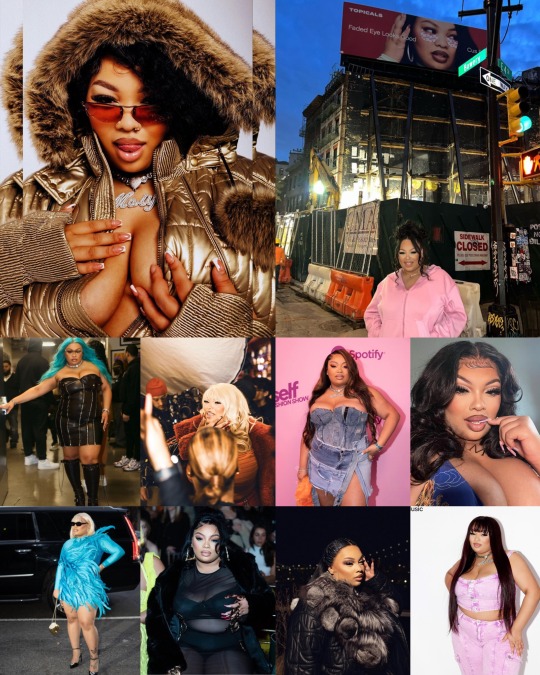
Doing campaigns (Topicals)
Performed at fashion week
her tiktok sounds been jumpin.
Major co-signs
Dope collabs (layy banks , flomilli, lola brooke)
Tons of content / press / interviews
Very sweet interviews
SUNYNEWPALTSBAE
youtube
Geezly

Poppin over seas
Already landed major collabs (Rochy Rd)
Great press runs
youtube
Raina Simone

This woman talent is insane.
Rap circles around these men.
Debut album dropping soon!
Tons of amazing freestyles
Extremely thought provoking, gives me chills.
Major co-signs. (Including Erykah Badu)
Major write ups.
Amazing interviews.
Howard girly
(A personal favorite idc about industry standards)
youtube
Selyna Brillaré aka TrapSelyna
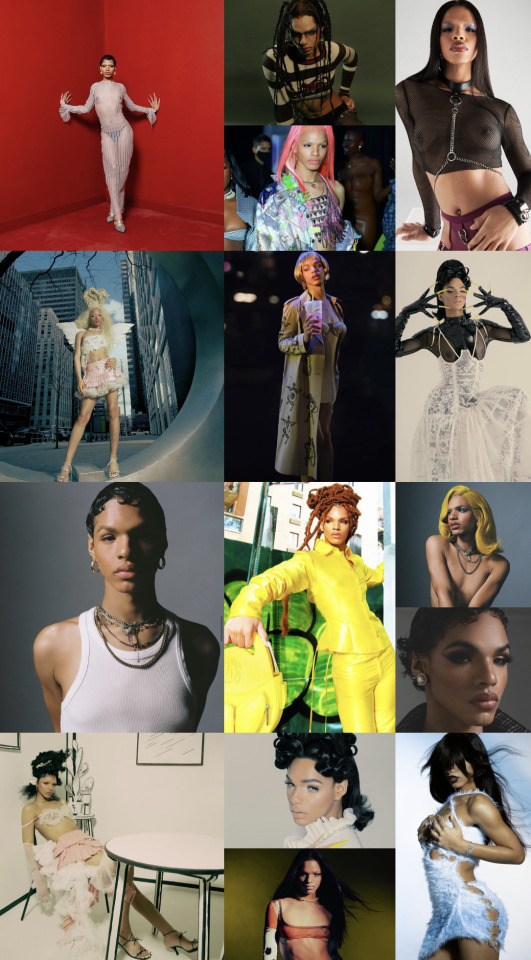
A literal super star.
Major write ups
Major campaigns (including Marc Jacobs & Burberry)
The voice of Telfar
Tiktok sounds jumping
Social media socialite
Amazing debut model career (featured in vogue)
Future actress
She does music for fun, she’s a major creative so she doesn’t have a bunch of music videos but i hope y’all enjoy her content.
Her debut ep soon drop.
In Rosalia’s music video!
Baby Storme
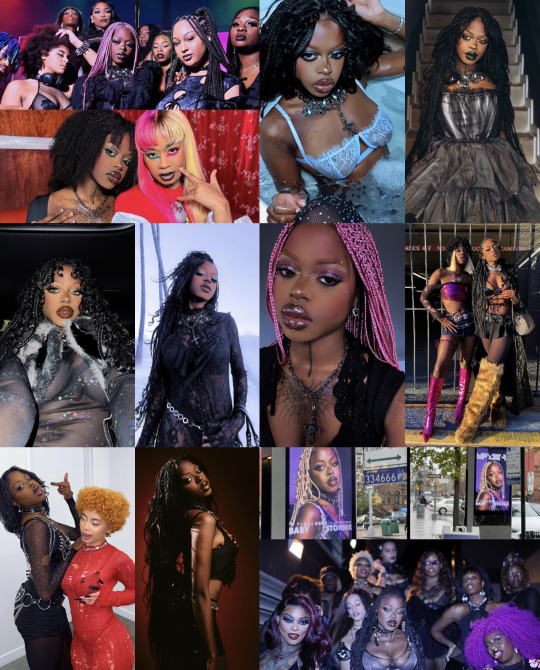
Personal fav
Putting on for the goth/alt girlies
Incredibly innovative and talented
Dope press
I love her content
From Yonkers so duhhhhh.
youtube
Drill /HardcoreRap/BarbieBarz!

Millions upon MILLIONS of views if you add all these girls together.
Major co-signs
London Hill got signed to Nicki 💞
Major impact on TikTok
Have performed or will be performing on major stages
Have plenty of deals / endorsements and campaigns
Beyond talented!
Have debuted on TV
Fashion Week performances
First ladies of their teams (Griselda & CokeBoys)
feat. Miah Kenzo, Chinese Kitty, Connie Diamond, BuggoutB, Princess Sany, KGoddess, Jenn Carter, BillyB, Kenzo B, London Hill, Shani Boni, Armani Caesar, WinterDaBrat, LegendaryRella, DreamDoll, YungDevyn & BreezyLyn
youtube
ALT / ROCKSTARS / POP / POETS/ ELECTRONIC/FASHIONBAES/VIBES

Fashion Icons
Major campaigns
Breaking down the stigma of New York only having one sound.
Major co-signs.
Beautiful content
Amazing models
JunglePussy, Maliibu, & Princess Nokia are OGS!
Duendita & H31R are groups!
Kiyanne can rap her ass off.
These girls bringing the VIBES!
feat. Madison Star, Diani, Girll Codee, Rokkstarnova, Duendita, Melii, Princess Nokia, Abby Jasmine, SPRTYK, Kiyanne, Baby Osamaa, Lagloinski, RillyRil, Maassai & JWords aka H31R, JunglePussy, MaliibuMiitch
youtube
Women ID love to mention:
OSHUN
youtube
Cleotrapa
youtube
14 notes
·
View notes
Text
Soldier Poet King SBI
I was sitting in bed, probably with my cat, watching I wanna say a birthday celebration stream with Karl, Foolish, Tina, and Brooke one year ago tonight. I was laughing and stimming and getting some screenshots, it was great, then a notification popped up. "Technoblade uploaded a video."
I quietly but audibly apologized for having to leave because he never uploads, even if the title did make me a little confused and nervous.
I thought it was a joke until about halfway through the letter. I kept saying "wait." I took it off full screen and refreshed the comments, saw curses and apologies and condolences, then refreshed again just in case. I heard "because I love you guys" and I couldn't hear anything anymore.
I cried so hard I felt sick. I couldn't catch my breath. I could see my iPad on the bed in front of me still playing the video but I wasn't watching or listening.
I have several stuffed animals, and I've just never named them or associated them with anything, with all but three. A septiceye from Jack's merch, a grey sheep named Friend, and a pink and white Squishmallow rabbit that makes me thinks of Origins. I don't really remember anything from that night after except holding that rabbit.
Grief is such a weird thing. There are so many good moments where I laugh until my stomach hurts. But there's also moments where I just emotionally and sometimes physically freeze. Watching videos, stims I've picked up from or because of him, seeing fanart.
It's beautiful and it's weird, that there will continue to be things, not directly from him, but about him, and I feel honored that these things happened at all, before and still.
I didn't think that would be so long, sorry about that, but thank you for letting me write it, and sorry if it made you emotional in any way, but thank you for reading it.
See you later, Techno, we miss and love you so much, we'll be alright, I hope you're resting easy out there.
Now then. Something I've wanted and been meaning to write for a long time. I'm quite proud of this, I had a lot of fun making it, it's so soft, I hope you enjoy.
Based on the song Soldier Poet King by The Oh Hellos
975 words
I mean a couple curses cause Tommy's in it if you care but no other warnings
The dull creak of wooden porch breathing then settling as the rocking chair I sat on lulled above it. A soft medley of chirps and trills from a variety of birds in the surrounding trees, an array of stark browns and calming greens, or high above in the sea of cerulean and cornflower with candy floss dots of porcelain. The occasional mumble or soft grunt of moo's from fenced in landscape. The gentle rush and subtle scent of a nearby stream. My personal symphony.
The sound of metal against metal brought me back.
"What the fuck, man, can't let me have one win, can you?"
"Afraid not."
"Come on, dude, I'm trying."
"Get better."
"What do you think I'm doing!"
"Not being better."
"Wiiiiiiiiiiiil!"
Wilbur was sitting under a tree and started playing his guitar louder as a response.
I saw Tommy move to tackle the older in my peripherals, but Techno moved to the side, before pinning his opponent to the earth with his slightly dull blade, blonde curls bouncing slightly as they peeked from beneath his helmet as he landed, the victor's own a color not unlike bubblegum or strawberry ice cream in wisps beneath his own, slightly unkept from the activities.
"Alright, settle down, be nice." I said in the direction of those dueling, rocking chair creaking slightly from the pressure of standing up, moving in the direction of gentle guitar strums.
"Come over here with Wil and I, I have something to show you."
"Whatcha got there, Dadza?" Asked Tommy, head tilting forward in question towards the slightly fraying book.
"Come over and find out, mate." I pat the ground at either side as a gesture to join.
Tommy sat at one end next to Wilbur, who promptly pulled him into a side cuddle, Techno sat at my other side, a bit more reserved on affection, but leaning in a tad to see the book in my hands, the cover read "making memories."
I opened to the first page, which held a photo of a small boy, hair mostly straight and dusty brown, about ten years before becoming the color it is now, he was holding a sword someone helped make out of cardboard, making a face as intimidating as a toddler could manage.
"Look at the little Technoblade!" Wilbur cooed in a higher octave. Techno began to curl into himself and his face slowly deepened in a shade of embarrassment.
"None of that, mate, because you see, that weapon of cardboard would become one of metal in a short matter of years, he would become a soldier in a sense, protecting the ones he holds closest to his chest, verbally and physically, a hero in and out of his home."
He adjusted himself to sit straighter, and brushed the pieces of hair from the front of his face, a whisper of a smile found itself on his features as I turned the page.
A boy, with a pile of muddy colored curls, mostly brushed to his right side, and wire rimmed glasses just on the side of being too big, smiled with closed lips and shining dimples.
"Wilby!"
Tommy stated brightly, Wilbur brought him into a closer cuddle.
"Right you are, and those glasses would soon come to fit him, and he would really start to find his voice, metaphorically, not long after this was taken if I'm correct. His already strong and bright imagination would scream and run and paint the world. He will be a poet, a musician, a singer, the list keeps growing, he knew then and knows still how to slay one with his tongue, an artist from the day he entered this earthside."
He adjusted the same shape of glasses he's grown attached to since the start that sit on his face, and brushed slender fingers along the neck of his instrument lightly, I turned the page again.
A boy, a mop of curly hair like sunshine and dandelions, blooms of freckles on his nose and cheekbones, a smile so bright and brilliant it reached the corners of his eyes, a gap indicating a missing tooth on display.
"You were so proud, runt." Techno stated. Wilbur reached to ruffle the still unruly curls of the boy the conversation surrounded.
"Course I was, bitch, now I've got these bad boys." He grinned and pointed to the tracks of metal across both rows of teeth.
"Give it time, Toms, you'll be rid of those in due time. This kid with hair like gold and gaps in his teeth will become a ruler, a glue of sorts to those who have the honor of becoming close with him, his spirit as bright as the sun and energy magnetic, can only continue to grow and roam wild and free."
Sun glistening off braces as he smiled, eyes just as crinkled as in the photo, blossoming freckles just as apparent.
"You heard the man, kid's a ruler, think that means he deserves a crown, now if you'd be so kind as to show me where it is, Technoblade."
"Not a chance, Theseus."
"What about you then, Phil?"
"What about me, mate?"
"We all got these names and stories, what about you, why didn't you get anything?"
Wilbur questioned, his head almost touching my shoulder to admire the pages of the book in my lap, eyes sparkling with wonder and curiosity.
Time stalled in that moment, the three surrounding me having seemingly gone back in time as we huddled together and reminisced. To the days where hair looked a little different, where faces were a little chubbier, where voices were a little higher, where bodies weren't taller than my own.
"I'm more than alright being the narrator and the reader of your own stories."
We continued to flip through the album, commenting on the majority, laughter joined part in the symphony.
9 notes
·
View notes
Note
Venus my sweet 🫶 I'm here to deliver a little love letter someone left for you during my valentines event 🥺✨
Thank you for being someone that opens their heart to others to sprinkle love all around.




Your words are a sonnet, each verse a delicate dance of beauty and depth. You are the artisan of imagination, sculpting worlds from the clay of creativity. Your prose is a murmuring brook, flowing with the gentle cadence of inspiration. With every stroke of your pen, you paint portraits of wonder upon the canvas of our hearts. Thank you for being the poet of our dreams, the architect of my fantasies, and the guardian of our souls.
🥺🥺🥺
What if I cry? Anon whoever you are thank you for your kind words, I just try my best to spread kindness and thank you for considering me to be talented! Thank you for enjoying my silly little writings. And rhy this is such a sweet idea for you to be Cupid today and deliver such sweet messages. You’re an angel and we should all cherish you more


2 notes
·
View notes
Photo

The prolific historian and biographer Philip Ziegler, who has died of cancer aged 93, was never less than scrupulously fair – but also honest – about the shortcomings of his subjects, who included some of the most prominent men and, occasionally, women of modern British history.
Lord Mountbatten’s personal vanity, deviousness and ambition, Edward VIII’s meanness and superficiality, even Edward Heath’s charmlessness were all remorselessly revealed, even though they amounted to official biographies and are books that have shaped the men’s reputations for posterity.
“The biographer’s first responsibility is to the truth and to the reader. If he is not prepared in the last resort to hurt and offend people for whom he feels nothing except goodwill then he should not be writing a biography,” Ziegler said in 2011.
The foibles of Mountbatten, the last viceroy of India before independence, were such that Ziegler wrote a note on his desk while writing the biography in the mid-1980s stating: “Remember, in spite of everything, he was a great man.” That is not necessarily the view any longer of many British and Indian historians, though it is hard to overlook Mountbatten’s significance to the modern subcontinent and his relatives in the Royal family.
If Ziegler’s patrician, establishment status and urbane charm helped to smooth his path to selection for such monumental biographies, his industry and the punctiliousness of his research meant that they come close to definitive. He said: “Ideally the biographer should know everything about his subject and then discard 99% of his information, keeping only the essential. Of course one can never hope to discover anything approaching everything, but one can find out a great deal.”
Ziegler was born in Ringwood, in the New Forest, to Dora (nee Barnwell) and Louis Ziegler, a retired army major. He was educated at Eton college and then studied law at New College, Oxford, graduating with a first. After national service with the Royal Artillery, he entered the Foreign Office, serving as a diplomat in Laos, Paris and Pretoria.
In 1966, with his wife Sarah (nee Collins), whom he had married in 1960, and two small children, he was posted to Bogotá, Colombia, as head of chancery at the British embassy. It was there the following year that, returning home from an embassy reception, he and his wife found armed robbers rifling the house. Sarah was killed in the melee and he was badly wounded.
The tragedy persuaded him to leave the diplomatic service and take a job with Sarah’s publisher father, William Collins, then the head of one of the largest publishing houses in the country. Ziegler became editorial director in 1972 and editor-in-chief of the company seven years later. He had already published two books, a biography of the Duchess of Dino, mistress of the wily French diplomat Talleyrand, in 1962, and one of the Georgian prime minister Henry Addington (later the reactionary home secretary Viscount Sidmouth) in 1965. A book about the Black Death followed in 1969, though that was to be his only venture into pre-modern history, and one on the battle of Omdurman (1973), as well as biographies of William IV (1971) and the Victorian prime minister Lord Melbourne (1976).
In 1980, Ziegler became a full-time writer, and a regular and eclectic stream of books followed: biographies of the 1920s’ society beauty Lady Diana Cooper (1981), Harold Wilson (1993), the minor poet Osbert Sitwell (1998), the publisher Rupert Hart-Davis (2005) and the actor Laurence Olivier (2013), as well as Heath (2010), Mountbatten (1985) and Edward VIII (1990), and a short biography of George VI (2014). There were also histories of Barings Bank (1988), London during the second world war (1995), the Rhodes Trust in Oxford (2008) and Brooks’s gentlemen’s club (1991). Not forgetting, Elizabeth’s Britain 1926 to 1986 and a book of photographic portraits of the Queen (2010).
All were assiduously researched. Given access to the royal archives, Ziegler ploughed through 25,000 letters of Edward VIII, revealing the shallowness of the king who abdicated and, allegedly to her displeasure, the Queen Mother’s relentless hostility towards him. His verdict that Edward was well meaning and that no monarch could have been more anxious to relieve the sufferings of his subjects though “few can have done less to achieve their aim”, was suitably waspish.
The biography of Mountbatten, for which he was chosen by the Broadlands trustees, custodians of his legacy, was followed by three volumes of the admiral’s diaries. The biography of Heath was also both official and comprehensive, but struggled to find the man’s elusive charm.
Of the Olivier biography, he told an interviewer at the Cheltenham literary festival in 2013: “In the course of my alarmingly long biographical career I have written about an inordinate number of prime ministers, kings and the like and I suddenly decided in old age that I would indulge myself and do myself an actor.” What he found to his alarm that there was very little substance beneath the parts the great actor played.
Following the death of his first wife, Ziegler married Clare Charrington, a social worker and bereavement counsellor, in 1971. She died in 2017. He is survived by the two children of his first marriage, Sophie and Colin, and by the son of his second, Toby.
🔔 Philip Sandeman Ziegler, biographer and historian, born 24 December 1929; died 22 February 2023
Daily inspiration. Discover more photos at http://justforbooks.tumblr.com
12 notes
·
View notes
Text
Once Upon a Time
An essay about the influence of one of the co-founders of the Writers Guild on Disney’s Cinderella

Disney’s Cinderella is a film obsessed with time. The thrumming of midnight is the most obvious example, but that same tower clock interrupts Cinderella’s opening song, too, as she attempts to convey the possibilities provided by dreaming in “A Dream Is a Wish Your Heart Makes.” “Oh, that clock! Old killjoy,” she complains and goes onto connect it to her position of servitude, explaining how the clock itself orders her around
The vocabulary of “time” saturates the dialogue. The word “time” is mentioned thrice in the prologue alone! Cinderella’s stepmother, Lady Tremaine, is the next to bring up the word. She accuses her step-daughter of having too much “time on [her] hands” that should be put to better use laboring for her and her stepdaughters in the house. Cinderella’s fairy godmother is also clued into the values of time. “Even miracles take a little time,” she remarks. Both surrogate mothers link time to work and production. How much someone can clean up, get done, maintain, and maybe even transform is dependent on the amount and use of their time.
Another kind of time distinct from the labor equation enters the fray at the palace. The prince’s ball is initiated by his father’s insistence that “it’s high time [his son] married and settled down,” so that he can see his grandchildren before he passes (Noticeably the interest of reproduction is an outside pressure rather than a motivation for the Prince and completely irrelevant to Cinderella herself). This ticking “high time” is a biological clock that connects back to the mention in the prologue of the “untimely death” of Cinderella’s father. It sets an enforced window of time between birth and death in which we are given to live fully.
The mice’s working song as they altruistically conceive to construct Cinderelly’s dress for the ball seems to most encapsulate the film’s perspective on time. “Every time she find a minute, that’s the time when they begin it!” Her animal friends complain that any moment Cinderella begins to encounter freedom and selfhood, the stepfamily increases its labor demands on her to claim ownership of that moment in time. Cinderella’s time to dream up solutions to her situation or even to dream up a comforting thought as she endures it is constantly being denied by the demands of her stepmother and stepsisters, who act more like employers than family. They rip away the scraps of leisure time she collects for herself in the same way they rip away her dress, becoming possessive of the scraps they had thrown away only once they see Cinderella making a personal life out of them. The expectation is that her time should only work towards maintaining the order (both in cleanliness and social standings) of the household. A dream may be a wish your heart makes, but with a stepfamily like that, who has time to dream?
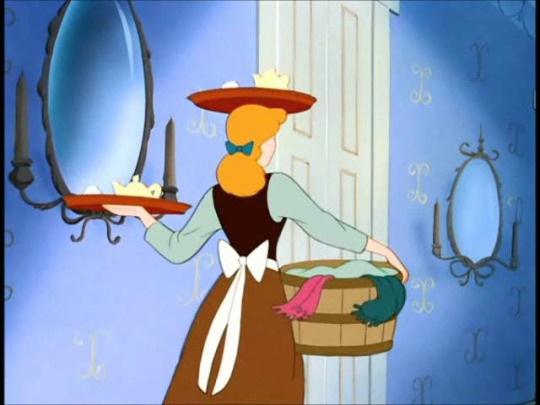
Cinderella in its Time
“We wonder,” activist-poet Gwendolyn Brooks wrote in her poem “kitchenette building,” which was published in her Pulitzer Prize-winning collection A Street in Bronzeville in 1945. It was published only a couple years before Cinderella’s production began. She meant wonder in the same vein that Cinderella dreams, wide-eyed, hopeful, and so often thwarted. “We wonder. But not well! not for a minute!” because “Dream,” she explained, only “makes a giddy sound, not strong like ‘rent,’ feeding a wife,’ ‘satisfying a man.’ The poem demonstrates how the deprivation of time—and the deprivation of resources one can otherwise accrue when given time—deny the lower classes the possibility of even imagining beauty and fantasy into their lives and futures. It creates a permanent relationship to the desperation, disgust, and disappointment that have to be immediately dealt with—garbage in the hall, onion fumes, and lukewarm shower water. Perhaps dreams exist amongst these lives, but no one has the time to notice them and take stock, which means that no one especially has time to transform their dreams into reality.
It’s no stretch to imagine a connection between Gwendolyn Brooks’s work and Disney’s Cinderella. I’ve already mentioned their chronological closeness but there’s also Cinderella’s uncredited screenwriter Maurice Rapf. He was the cofounder of the screenwriters guild (which grew into the Writers Guild of America, the organization currently on strike in 2023. He would later be blacklisted in Hollywood in 1947 due to his association with the Communist Party USA (hence the “uncredited”). He was also brought on, due to his aggressive anti-Uncle-Tom stance, to shape up Song of the South before being pulled from the project after only seven weeks due to disagreements with the infamous lead screenwriter for the film. That a vehement Marxist and antiracist like Maurice Rapf might have more than a passing familiarity with Brooks’s poetry seems more than likely, and it encourages us to read the film more deeply with this kind of lens.
Cinderella’s Histories

It’s well known that the Cinderella story type is an old folktale with versions across a variety of cultures. Disney’s Cinderella draws heavily on Charles Perrault’s French version from 1697. The pumpkin, the fairy godmother, the glass slipper: all Perrault. But the film’s far from a truly faithful adaptation.
Some strange anachronistic names permeate the film. Perhaps you remember the round and adorable mouse, Gus. Do you recall, though, that Cinderella names him Octavius, then christens him Gus for short? Gus, of course, is short not for Octavius but for Augustus. It’s a reference to the Roman emperor who began life with the name Octavius as part of the commoners of ancient Rome, (the plebians) before rising to the highest position of Caesar, receiving the name Augustus and ushering in the Pax Romana, an unprecedented period of peace within the Roman Empire. In the context of the film, his name is used to reference crossing the class barrier to achieve a fairytale happy ending.
Another name, perhaps less unusual, that still beams within a Marxist reading is Cinderella’s stepsister, Anastasia. While of Greek origin, the film pays little respect to its meaning in that language of “resurrection.” It points rather to a notoriously non-Disney princess, instead. The fantasy of Anastasia Romanov’s survival of the Bolshevik Revolution was well established by the time Cinderella was being written. Drawing an even more direct connection, Rapf, whose semester abroad in the USSR in the 1930s (and terrifying visit as a Jew through Nazi Berlin on his way back) inspired his adamant communism. The writers of Cinderella place their Anastasia as one of the stepsisters in a position of power and privilege that harms the laboring protagonist, Cinderella. While it doesn’t direct the stepfamily to a firing squad, through this choice the film refuses to romanticize the Romanovs and the aristocratic class and mindset they represent more broadly.
And They Lived Happily Ever After
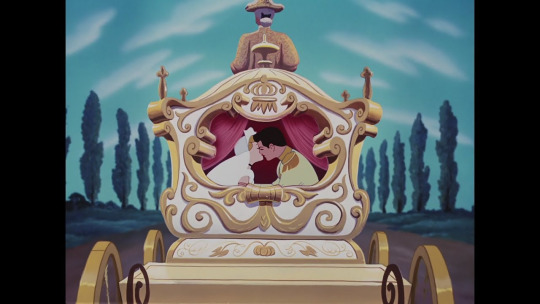
If we take a Marxist reading to be true, then we’re forced to ask the question: why does Cinderella ascend to royalty? The film closes with an image of what is perhaps the most iconic happy ending in the fairytale film genre with Cinderella and Prince Charming riding off in their honeymoon carriage with a final kiss. It replaces Snow White’s castle in the clouds and all its religious allegory for a much more secular conclusion. Logistically, this marriage would bring Cinderella into the fold of aristocracy, but the visuals the animators depict de-emphasize the castle, the class status, and even the ceremony that grants her access to the upper crust.
In the final minute of the film, Cinderella is once again sprinting away from the castle and the king, descending the stairs rather than ascending to a throne. The bells of the clock tower chime away again and the motif of her lost slipper reoccurs, reminding the audience of Cinderella’s urgency, the limited window of time offered to her to find personal freedom. It also provides an opportunity for the king to kneel before her and become her foot servant. Still, she doesn’t remain to take charge of him or the kingdom, she continues her descent away from royalty towards the Public with the person who disregarded class divisions.
Then there’s that final famous image in the carriage, so pervasively symmetrical. A pyramid structure is bordered by natural elements. Then, making the escape from unregulated servitude possible for Cinderella, a laborer, the carriage driver, sits atop the triangle, signaling his power and importance to the narrative’s happy ending. When we transition to the pages of the book that close the film, his person is replaced by a crown.
At the center, Cinderella and her prince consummate their union. From the regulated actions of labor and class, they are escaping into the realm of the carnal. Bodily desires are finally allowed to take precedence for Cinderella instead of the nagging bells that demand she wake up and get to work. The government of Time instituted by the aristocracy on Cinderella as a member of the working class yields to the cries and celebrations of the public and to Cinderella’s own pleasure. “Ever after” is beyond the reach of Time. And, it’s not heavenly like Snow White’s, but in a realm where one is no longer alienated from their own body, its needs and its rhythms.
Back in her rags after her encounter at the ball, Cinderella remarks, “I guess I forgot about everything, even the time…” The discourse around Cinderella has criticized its marriage plot romance, but that romance signifies the ability of connection and union—at the personal level, yes, but also in a socialist fashion—to psychologically and politically help liberate oneself from the many hegemonies that render life unnecessarily laborious, unrelenting, and full of drudgery. Life, when made in partnership with others instead of hierarchies, could feel like a fantasy flying by, like a timeless dream.
9 notes
·
View notes
Text
Poetry is an art, and the artist in poetry is one who writes for pure and noble pleasure the thing he writes, and who desires to give to others the same or a similar pleasure by his poems which he had in writing them. The things he most cares about are that the form in which he puts his thoughts or feelings may be perfectly fitting to the subjects : and that subject, matter, and form should be as beautiful as possible — but for these he cares very greatly; and in this Chaucer stands apart from the other poets of his time.
— Stopford Augustus Brooke, English Literature
3 notes
·
View notes
Note
20 & 25? Triple Frontier is disqualified from taking part in this question.
Oh Lua I was so not going to say Triple Frontier anyway 👀👀👀 Thank for the ask my lovely 🧡
20. A movie you think looks beautiful. That’s a tough one, and I’d be tempted to say Bram Stoker’s Dracula but I’ll go with Pandora’s Box. I fell hard for Louise Brooks.

25. Your favourite movie. Easy, it’s Dead Poets Society. I know on paper it’s a movie about rich boys in an elitist school (everything I hate) but John Keating’s teaching made me who I am.
Movie asks!
2 notes
·
View notes